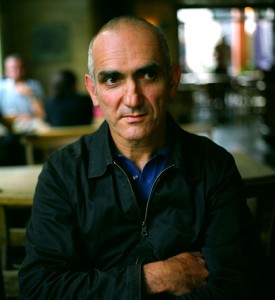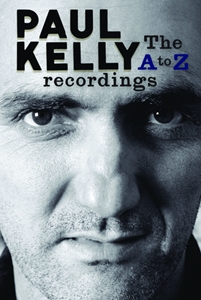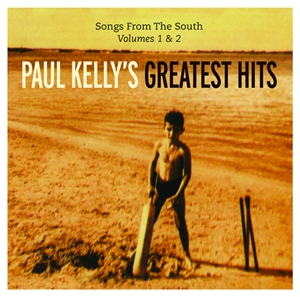Riffs, Rants & Rumors: Paul Kelly Knows His ABC's
posted in: Features • Music News • Rock
 In the US, Australian songsmith Paul Kelly‘s cult-hero status was cemented by a pair of late-˜80s A&M releases”Gossip and Under The Sun. Kelly’s concise, cutting lyrics and no-nonsense tunes suggested sort of an Aussie answer to Graham Parker, with the sharp, sympathetic backing of The Messengers revving things up in a rather Rumour-like way. Leaving The Messengers in the early ˜90s after two more albums, Kelly ultimately embraced his folk and country influences and pursued the rootsy, acoustic-based singer/songwriter path he treads to this day, having slowly but steadily expanded his American audience over the years.
In the US, Australian songsmith Paul Kelly‘s cult-hero status was cemented by a pair of late-˜80s A&M releases”Gossip and Under The Sun. Kelly’s concise, cutting lyrics and no-nonsense tunes suggested sort of an Aussie answer to Graham Parker, with the sharp, sympathetic backing of The Messengers revving things up in a rather Rumour-like way. Leaving The Messengers in the early ˜90s after two more albums, Kelly ultimately embraced his folk and country influences and pursued the rootsy, acoustic-based singer/songwriter path he treads to this day, having slowly but steadily expanded his American audience over the years.
In his homeland, however, Kelly is a national hero regarded with an almost Springsteen-level reverence, earning just about every honor and award the Australian music industry has in its power to bestow. But with the current ramping-up of Kelly activity stateside, it may finally be time for America to begin playing catch-up. Not only has he got a new eight-CD box set, he’s written a book as the box’s companion piece (also available separately), and there’s a comprehensive, two-disc anthology getting its first US release.

The box, The A-Z Recordings, had its genesis in a series of specially configured live shows. I started doing these A-Z shows about seven years ago, Kelly explains, where I do 100 songs in alphabetical order by title, over four nights, twenty-five songs a night. It’s a sort of theatrical show, with the letters up [on a big easel onstage] and storytelling, and intermission. I found that audiences really liked the idea. I started doing them once or twice a year and recorded the shows as I went. That led to the idea of putting out the recordings. We ended up making it an eight-CD set so we could match the nights evenly, four nights, two halves each night.
Kelly’s book, How To Make Gravy, began as an outgrowth of this idea. I thought I’d make a beautiful booklet to go with the box set, he explains, to write a series of liner notes telling stories around the songs. I started doing that and fairly early on realized, ˜If I keep going like this I could write a book!’ That’s exactly what he did, taking a couple of years off from his usual musical duties to get it done. The book mirrors the A-Z box set, Kelly says, it’s got the same structure¦each chapter starts with a lyric, and then a story around that lyric, and it’s in alphabetical order. Kelly likes to call the book a mongrel memoir, because It’s a patchwork of styles in the writing. I had such a rigid structure with the alphabet, that paradoxically gave me a lot of freedom to sometimes write a chapter that was more personal memoir or family history, or more like a musical essay talking about influences; there’s one whole chapter just about Frank Sinatra. There are lists, tour diaries, all kinds of things, but I had this ironclad structure of the alphabet to allow me to mix these things up.
 Add to that the release of Songs From The South: Paul Kelly’s Greatest Hits, covering everything from the mid-˜80s to the present on two CDS, and the promise of long-overdue US reissues of Kelly’s back catalog, and you’ve got the makings of a proper Yankee renaissance for the Australian troubadour. Of course, you can take the songwriter out of Oz”Kelly just wrapped up a string of A-Z shows in the US”but extracting Oz from Kelly’s musical makeup is a fool’s errand. Though the appeal of his songs is international, Kelly’s lyrics have always been rich with local color, on everything from the travelogue From St. Kilda to King’s Cross to the aboriginal land-rights ballad From Little Things Big Things Grow. I really admired what I call cinematic songwriters, who mapped out certain territories, says Kelly. Chuck Berry‘s an obvious example”he kind of mapped out America. Lou Reed mapped out a very small part of New York, and songwriters like Bruce Springsteen mapped out New Jersey. I sort of mapped out my territory as well. I think the more your music sort of stinks of the place you come from, the more powerful it is.”
Add to that the release of Songs From The South: Paul Kelly’s Greatest Hits, covering everything from the mid-˜80s to the present on two CDS, and the promise of long-overdue US reissues of Kelly’s back catalog, and you’ve got the makings of a proper Yankee renaissance for the Australian troubadour. Of course, you can take the songwriter out of Oz”Kelly just wrapped up a string of A-Z shows in the US”but extracting Oz from Kelly’s musical makeup is a fool’s errand. Though the appeal of his songs is international, Kelly’s lyrics have always been rich with local color, on everything from the travelogue From St. Kilda to King’s Cross to the aboriginal land-rights ballad From Little Things Big Things Grow. I really admired what I call cinematic songwriters, who mapped out certain territories, says Kelly. Chuck Berry‘s an obvious example”he kind of mapped out America. Lou Reed mapped out a very small part of New York, and songwriters like Bruce Springsteen mapped out New Jersey. I sort of mapped out my territory as well. I think the more your music sort of stinks of the place you come from, the more powerful it is.”
The stories Kelly tells have always been distinguished by his narrative economy and emotional impact, which surely go hand in hand, whether he’s relating the tale of an alcoholic trying to make things right with his family (To Her Door), retelling the tale of Othello as a three-minute country tune (Desdemona) or rewriting renowned author Raymond Carver‘s story So Much Water So Close To Home as Everything’s Turning to White. When I first started writing songs, recalls Kelly, I came across Raymond Carver’s short stories and I couldn’t get enough. I loved the way his stories had a lot happening around the edges; often there seemed to be something about to happen that didn’t actually happen in the story. I like the sparseness of the prose, the way he seemed to convey a lot of information without using a lot of words. It struck me that that’s a good model for a songwriter. I needed to write songs that could tell a story or imply a story beyond the song, and still have that in three-and-a-half minutes. I think short stories and songs have a lot in common anyway, they both have to carry their freight lightly, and have to get in and out.
 The country influence in Kelly’s work”which can be heard as far back as his ˜80s barroom weeper Somebody’s Forgetting Somebody (Somebody’s Letting Somebody Down), come in handy for keeping things concise. There’s some fairly strong country roots in a lot of my songs, he admits. Keith Urban did one of my songs for one of his early records, a song called ˜Blue Stranger.’ I learned my first chords on guitar playing Hank Williams. He had such lonesome lyrics, but the music’s always got a little perk. I always loved the contrast between the sadness of his lyrics and the perkiness of his tunes. Recently, Kelly was invited to record a duet of the Hank classic I’m So Lonesome I Could Cry with fellow Aussie Kasey Chambers for her new Storybook album. Nearly every cover that I’ve heard of that song is slower than the original, he observes. People tend to kind of wallow in that song”you listen to the original, and he’s just [snaps fingers] delivering it. Cutting straight to the heart of the matter without getting bogged down in emotional grandstanding is a large part of what makes Kelly’s songs so powerful. And between the box set, the book, the anthology and the upcoming reissues, he’s got a chance to connect with more people than ever before.
The country influence in Kelly’s work”which can be heard as far back as his ˜80s barroom weeper Somebody’s Forgetting Somebody (Somebody’s Letting Somebody Down), come in handy for keeping things concise. There’s some fairly strong country roots in a lot of my songs, he admits. Keith Urban did one of my songs for one of his early records, a song called ˜Blue Stranger.’ I learned my first chords on guitar playing Hank Williams. He had such lonesome lyrics, but the music’s always got a little perk. I always loved the contrast between the sadness of his lyrics and the perkiness of his tunes. Recently, Kelly was invited to record a duet of the Hank classic I’m So Lonesome I Could Cry with fellow Aussie Kasey Chambers for her new Storybook album. Nearly every cover that I’ve heard of that song is slower than the original, he observes. People tend to kind of wallow in that song”you listen to the original, and he’s just [snaps fingers] delivering it. Cutting straight to the heart of the matter without getting bogged down in emotional grandstanding is a large part of what makes Kelly’s songs so powerful. And between the box set, the book, the anthology and the upcoming reissues, he’s got a chance to connect with more people than ever before.
